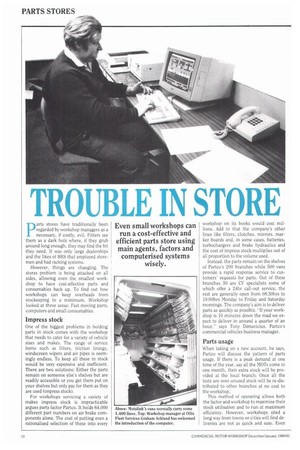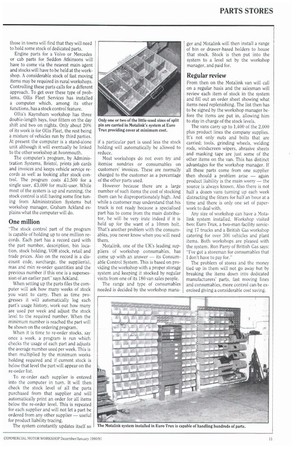TROUBLE IN STORE
Page 86

Page 87

If you've noticed an error in this article please click here to report it so we can fix it.
Even small workshops can run a cost-effective and efficient parts store using main agents, factors and computerised systems wisely.
parts stores have traditionally been regarded by workshop managers as a necessary, if costly, evil. Fitters see them as a dark hole where, if they grub around long enough, they may find the bit they need. It was only large dealerships and the likes of BM that employed storemen and had racking systems.
However, things are changing. The stores problem is being attacked on all sides, allowing even the smallest workshop to have cost-effective parts and consumables back up. To find out how workshops can keep overheads from stockeeping to a minimum, Workshop looked at three areas: Fast moving parts. computers and small consumables.
Impress stock
One of the biggest problems in holding parts in stock comes with the workshop that needs to cater for a variety of vehicle sizes and makes. The range of service items such as filters, friction linings, windscreen wipers and air pipes is seemingly endless. To keep all these in stock would be very expensive and inefficient. There are two solutions: Either the parts remain on someone else's shelves but are readily accessible or you get them put on your shelves but only pay for them as they are used (impress stock).
For workshops servicing a variety of makes impress stock is impracticable argues parts factor Partco. It holds 64,000 different part numbers on air brake components alone. The cost of putting even a rationalised selection of these into every workshop on its books would cost millions. Add to that the company's other lines like filters, clutches, mirrors, marker boards and, in some cases, batteries, turbochargers and brake hydraulics and the cost of impress stock multiplies out of all proportion to the volume used.
Instead, the parts remain on the shelves of Partco's 200 branches while 500 vans provide a rapid response service to customers' requests for parts. Out of these branches 50 are CV specialists some of which offer a 24hr call-out service, the rest are generally open from 08:30hrs to 18:00hrs Monday to Friday and Saturday mornings. The company's aim is to deliver parts as quickly as possible. "If your workshop is 10 minutes down the road we expect to deliver in around a quarter of an hour," says Tony Dimavicius, Partco's commercial vehicles business manager.
Parts usage
When taking on a new account, he says, Partco will discuss the pattern of parts usage. If there is a peak demand at one time of the year, say all the MOTs come in one month, then extra stock will be provided at the local branch. Once all the tests are over unused stock will be re-distributed to other branches at no cost to the workshop.
This method of operating allows both the factor and workshop to maximise their stock utilisation and to run at maximum efficiency. However, workshops sited a Long way from towns or cities will find deliveries are not as quick and easy. Even
those in towns will find that they will need to hold some stock of dedicated parts.
Engine parts for a Volvo or Mercedes or cab parts for Seddon Atkinsons will have to come via the nearest main agent and stocks will have to be held at the workshop. A considerable stock of fast moving items may be required in rural workshops. Controlling these parts calls for a different approach. To get over these type of problems, 011is Fleet Services has installed a computer which, among its other functions, has a stock control feature.
011is's Kaynsham workshop has three double-length bays, four fitters on the day shift and two on nights. Only about 20% of its work is for 011is Fleet, the rest being a mixture of vehicles run by third parties. At present the computer is a stand-alone unit although it will eventually be linked to the other workshop at Avonmouth.
The computer's program, by Administration Systems, Bristol, prints job cards and invoices and keeps vehicle service records as well as looking after stock control. The program costs £1,500 for a single user, £3,000 for multi-user. While most of the system is up and running, the stock control is still having some fine tuning from Administration Systems but workshop manager, Graham Ackland explains what the computer will do.
One million
"The stock control part of the program is capable of holding up to one million records. Each part has a record card with the part number, description, bin location, stock holding, VOR stock. retail and trade prices. Also on the record is a discount code, surcharge, the supplieris), max and min re-order quantities and the previous number if this one is a supersession of an earlier part" says Ackland.
When setting up the parts files the computer will ask how many weeks of stock you want to carry. Then as time pro gresses it will automatically log each part's usage history, work out how many are used per week and adjust the stock level to the required number. When the minimum number is reached the part will be shown on the ordering program.
When it is time to re-order stocks, say once a week, a program is run which checks the usage of each part and adjusts the average number used per week. This is then multiplied by the minimum weeks holding required and if current stock is below that level the part will appear on the re-order list.
To re-order each supplier is entered into the computer in turn. It will then check the stock level of all the parts purchased from that supplier and will automatically print an order for all items below the re-order level. This is repeated for each supplier and will not let a part be ordered from any other supplier — useful for product liability tracing.
The system constantly updates itself so if a particular part is used less the stock holding will automatically be allowed to reduce.
Most workshops do not even try and itemise sundries or consumables on customers' invoices. These are normally charged to the customer as a percentage of the other parts used.
However because there are a large number of such items the cost of stocking them can be disproportionately high. And while a customer may understand that his truck is not ready because a specialised part has to come from the main distributor, he will be very irate indeed if it is held up for the want of a lOrnm bolt. That's another problem with the consumables, you never know when you will need them.
Motalink, one of the UK's leading suppliers of workshop consumables. has come up with an answer — its Consumable Control System. This is based on providing the workshop with a proper storage system and keeping it stocked by regular visits from one of its 180 van sales people.
The range and type of consumables needed is decided by the workshop mana
ger and Motalink will then install a range of bin or drawer-based holders to house that stock. Stock is then put into the system to a level set by the workshop manager, and paid for.
Regular review
From then on the Motalink van will call on a regular basis and the salesman will review each item of stock in the system and fill out an order sheet showing what items need replenishing. The list then has to be signed by the workshop manager before the items are put in, allowing him to stay in charge of the stock levels.
The vans carry up to 1,400 of the 2,000 plus product lines the company supplies. It's not only nuts and bolts that are carried; tools, grinding wheels, welding rods, windscreen wipers, abrasive sheets and masking tape are just some of the other items on the van. This has distinct advantages for the workshop manager. If all these parts come from one supplier then should a problem arise — again product liability is the main worry — the source is always known. Also there is not half a dozen vans turning up each week distracting the fitters for half an hour at a time and there is only one set of paperwork to deal with.
Any size of workshop can have a Motalink system installed. Workshop visited two: Euro Trux, a two-man facility servicing 17 trucks and a British Gas workshop catering for over 300 vehicles and plant items. Both workshops are pleased with the system. Ron Parry of British Gas says: "I've got a storeman for consumables that I don't have to pay for."
The problem of stores and the money tied up in them will not go away but by breaking the items down into dedicated manufacturers' parts, fast moving lines and consumables, more control can be exercised giving a considerable cost saving.












































































































